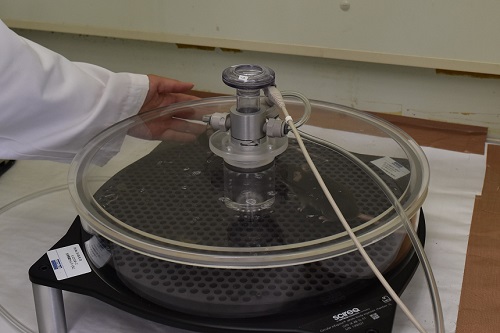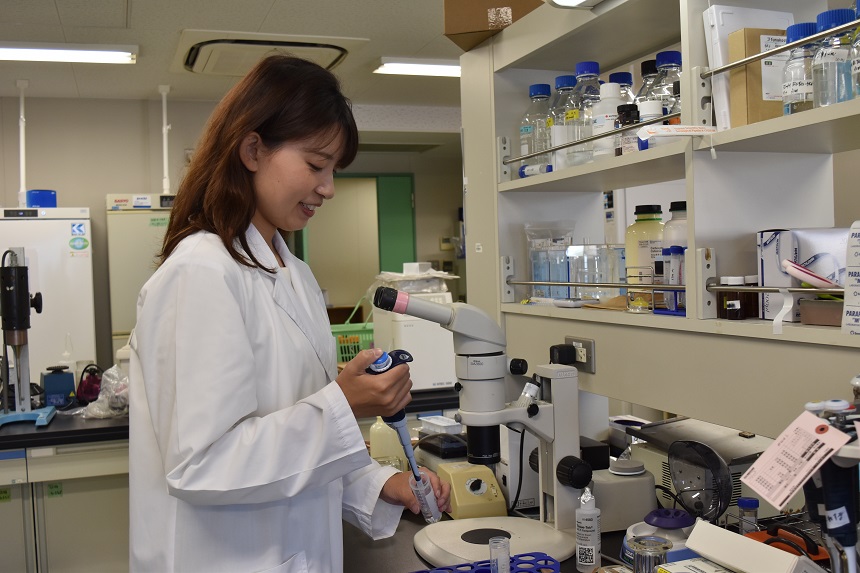Interview of Associate Professor (Special Recognition) Ami OGURO
Researchers selected for JST FOREST in the FY2021
Focusing on odorant metabolism to uncover mechanisms of fragrance sensitivity that will inform treatment development
Focusing on lipid metabolites and investigating their effects on the brain
My specialty is lipid metabolism, and my research particularly focuses on the metabolites and physiological activities of unsaturated fatty acids including arachidonic acid and docosahexaenoic acid (DHA).
Arachidonic acid and DHA, which are known as components of membrane phospholipids, have a variety of physiological activities. These lipids are found in most fish and meat, and have been empirically observed to have positive effects on the body and brain. However, their molecular mechanisms of action are not fully understood. Metabolites of these fatty acids in particular have begun to attract attention in recent years.
When we ingest arachidonic acid or DHA, the fatty acids are temporarily incorporated into cell membranes. Then, when the body needs them, they are cleaved from cell membranes and converted to other substances by various metabolic enzymes. It is now starting to be said that the metabolites these enzymes produce may have useful physiological functions. This idea also inspired me to begin studying the formation mechanisms and physiological activities of lipid metabolites as a student, and I have continued that research ever since. Because only a small amount of metabolites is produced, specific measurement conditions must be devised to ensure accurate quantitation. It was really challenging to determine these conditions, but through persistent efforts, I was recently able to achieve highly accurate quantitation.
I am currently working to determine the mechanisms by which DHA intake suppresses symptoms of neurodegenerative diseases in mice. This research showed that giving mice an enzyme that inhibits DHA metabolism negates the effects of DHA. As was initially suspected, it appears that it is not DHA itself, but rather its metabolites that play an important role in the effects of DHA intake. In fact, I found that mice given DHA show a marked increase in DHA metabolites in the brain. This is truly fascinating, and I would like to further pursue this research.
Seeking to uncover mechanisms of fragrance sensitivity by investigating odorant metabolism
These lipid-metabolizing enzymes are known to be involved in the metabolism of not just lipids within the body, but also foreign substances from outside the body. My “scent” research project focusing on such metabolism of foreign substances was selected for a grant from the FOREST (Fusion Oriented REsearch for disruptive Science and Technology) program of the Japan Science and Technology Agency.
I became interested in scents through the above-described research on enzymes that metabolize lipids and foreign substances. In one experiment, I discovered by chance that some metabolic enzymes are highly expressed in the olfactory bulbs, which connect the nasal cavities to the cerebrum. At that time, the idea came to me that odorants entering through the nose might also be metabolized by metabolic enzymes in the olfactory bulbs.
Fragrance sensitivity, which is when exposure to chemicals in products such as perfume and fabric softener causes symptoms such as headaches and nausea, has become a social problem in recent years. Even though this is a serious problem that can even prevent people from leaving their home in severe cases, it has been considered challenging to uncover the underlying mechanisms because symptoms vary from person to person and based on factors such as physical condition. I hypothesized that the substances that cause fragrance sensitivity might also be metabolized by xenobiotic metabolizing enzymes (XMEs) in the olfactory bulbs or brain. In addition, because the expression and activity of these metabolic enzymes can be easily altered by foreign substances, understanding how metabolic enzyme activity changes upon exposure to certain odorants could shed light on the mechanisms that promote or suppress fragrance sensitivity symptoms. In addition, because activity of these XMEs varies from person to person and based on factors such as physical condition, such knowledge could also help to pinpoint reasons for individual variation in fragrance sensitivity symptoms. I am using these ideas as a stepping stone to uncovering the mechanisms of fragrance sensitivity.
To start, I found that these odorants accumulated in the olfactory bulbs of the brain and that expression of XMEs in the olfactory bulbs changed in mice exposed to odorants that could trigger fragrance sensitivity. In the future, I would like to conduct detailed research on topics such as the extent to which odorants are metabolized and whether fragrance sensitivity symptoms improve or worsen when odorants are metabolized. FOREST program projects are generally funded for seven years, and I hope to conduct experiments in mice for the first three years and in humans for the latter four years. If possible, I would like to collaborate with the department of otorhinolaryngology at the Hiroshima University School of Medicine for this research.

Device used to expose mice to odorants in the experiment
Aiming to answer questions encountered in everyday life
I believe that uncovering mechanisms of fragrance sensitivity through this research will lead to development of treatments to suppress symptoms of fragrance sensitivity. For example, if we learn that odorants directly cause fragrance sensitivity, we could convert a harmful odorant into a harmless metabolite by deliberately increasing the activity of the metabolic enzyme that acts on that odorant. This would help the large number of people who are currently suffering from fragrance sensitivity.
When I conduct biological research, I feel that the path of my research often brings answers to questions encountered in everyday life. The same is true for this research on scents. Even though we might have no idea where a basic research project will take us when we begin, as we delve more deeply into the subject, there are moments when it connects to everyday concerns and things we wonder about. This kind of fun and rewarding experience is what keeps me doing research. I would like to continue leveraging my natural curiosity and tenacity to answer such everyday questions through research.



 Home
Home

